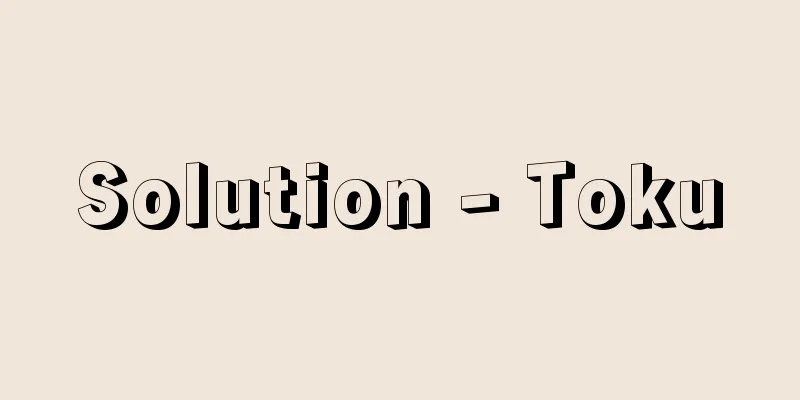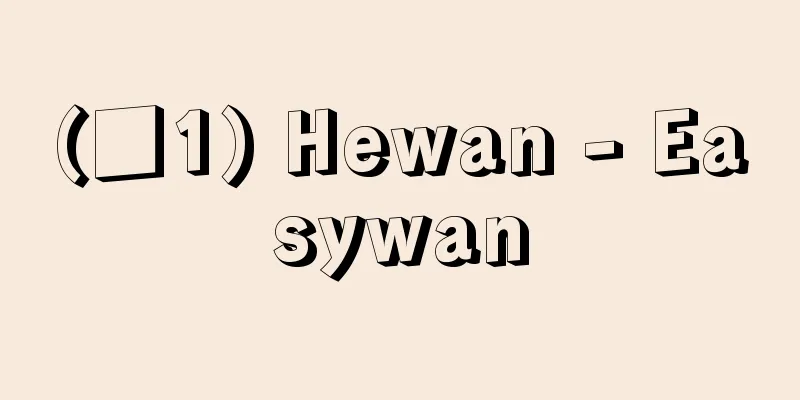[1] 〘Ta Ka 5 (4)〙① To untie something that is tied or sewn. ※Kojiki (712) Vol. 1, Song: “The sword cord has not yet been attached, nor the obi . ” ※Yamato ( c . 947-957) 169: “'Please take this as a keepsake,' he said, and untied the obi and let her take it.” ② To take apart something that is bound together, or open something that is sealed. ※Man'yoshu (late 8th century) 10.2012: “I have not seen the five hundred pieces of white jade untied , and I sleep, waiting for the day when we will not meet.” ※Heike (early 13th century) 11: “The judge did not open the seal, but sent it quickly to Lord Tokitada.” ③ To separate and organize something that is tangled or disorganized. ※Genji (c. 1001-14), Te-narai: "She combed her hair by hand. <omitted> When it was done, it was shiny and lustrous." ④ To remove decorations on carriages and clothes. ※Tonbo (c. 974), Chu: "Just now, the carriage costumes have been changed and the attendants are all in disarray." ⑤ To clear away anger, bad mood, bitterness, sadness, doubt, and other grudges in one's heart, leaving one feeling refreshed. "Resolve doubts." ※Half the Life of a Concubine (1904), Fukuda Eiko, 7: "At the very least, she should fulfill her duties as a woman and dispel the errors of the world." ⑥ To remove duties, responsibilities, contracts, restrictions, and other binding things. To dismiss, cancel, or lift a ban. ※Maihime (1890)〈Mori Ogai〉 "The hated chief of the government finally conveyed his intention to the embassy and relieved me of my duties and duties." ⑦ To break down a posture that had been taken for defense, vigilance, encirclement, etc. "Relieve the vigilance" "Relieve the siege" ※Kinseiki-ki (1875-81)〈Somezaki Nobufusa〉 12 "Finally, the fortifications in Hakodate were lifted " ⑧ To cut up fish or birds and animals with a blade. To cook with a knife. Also, to dissect. ※Daiki - February 26, 1152 (Nihei 2) "Gyoken immediately freed the carp " ⑨ To give an answer to a question or problem. To answer. ※Tsurezuregusa (around 1331) 103 “The place where the attendants made riddles and solved them” ※She and the Boy (1917)〈Tokuda Shusei〉 5 “Doing algebra, solving geometric problems” 10. Find the range of unknown values that satisfy a given equation or inequality. Find a solution . [2] 〘Self-Ka 2〙 ⇒Solution (Solution) To be solved [Solution] 〘Automatic Ka next 1〙 To-ku 〘Automatic Ka next 2〙① Something that has been tied becomes separate. A knot comes undone. ※Man'yoshu (late 8th century) 14.3483 "If it comes undone in the day, the string will cling to my back, but at night it will be peaceful. " ※Makura (end 10th century) 89 "The red string has come undone, and I asked if I could tie it again." ② Anger, bad mood, resentment, sadness, and other grudges in one's heart disappear. ※Saidaiji Konkomyo Saisho-o-kyo Sutra, early Heian period (around 830), 3: "All fears, worldly desires, and restrictions are resolved." ※Ukigumo (1887-89), Futabatei Shimei, 1: "The knots in my heart are released, and my irritability disappears." ③ The barriers between hearts disappear. To become familiar with one another. To open up. ※Man'yoshu (late 8th century), 17:3940: "For ages my heart has been filled with the spirit of a sword, and I cannot hide from the sight of my son's hands." ※Genji (around 1001-14), Yugao: "After hearing of the sight of the emperor's death at Rokujo-watashi, I recalled." ④ My heart becomes peaceful. I feel at ease. ※Man'yoshu (late 8th century) 9/1753 "With joy I untied the strings, Like a house , I was freed and played."⑤ To be freed from duties, responsibilities, contracts, restrictions, and other bindings. ※Kokinshu (905-914) Zōge 963/Prelude "When Sakon no Shogen was freed"⑥ To relax the posture taken for defense, vigilance, siege, etc. To be freed. ※Rakugo/The Nose of Success (1892)〈Kinkoro Kosan〉 "I will take this and go out, and hide in the hole until the lock is loosened."⑦ To disperse something that is organized. To break up. ※Black Eyes and Brown Eyes (1914)〈Tokutomi Roka〉4 "Since my brother's private school was freed, I was left alone in Kumamoto."⑧ To get an answer to a question or problem. Also, to clarify something that was not clear, and to understand it. [Bunmeihon Setsuyoshu (Muromachi-ch)] *Shuncho (1903) <Tayama Katai> 11 "This question has never been finally solved." Ge-su [Solution] ("Ge" is the Go-on pronunciation of "kai") [1] [Independent consonant] To be liberated (gedatsu) . To be enlightened. [Nippo Jisho (1603-04)] [2] [Other consonant] ① To present a letter of release (gejo) to a higher authority or a noble. To report. *Ryo Gikai (718) official text: "Kaishiki Shikibusho kaisho (the Ministry of Ceremonies will kaisho the matter. The matter etc. will be carefully explained." ② To untie something that is tied or solidified. (i) To untie something that is tied. *Yohkyoku/Utauranai (around 1432): "When you step on a sword mountain with your foot, both the sword and the tree will be untie." (ii) To break something solid into pieces. To disintegrate. (iii) To break a promise, agreement, etc. To release. [Bunmeihon Setsuyoshu (mid-Muromachi period)] (ii) To remove bondage, poison, etc. [Bunmeihon Setsuyoshu (Muromachi period)] ③ To force someone to leave their job. To dismiss. ※Taiheiki (late 14th century) 15 "He was punished by the emperor, dismissed from his priesthood, and replaced by Sadahisa ." ④ To make something unclear clear. In particular, to understand the heart, feelings, and logic of things. To understand. ※ Roman-Portuguese Dictionary (1595) "Dissoluo〈abbreviation〉Fushinwo guesuru (gesuru) 、toku" [3] [Other Sa 4] Same as (2). ※Joruri, Nemoto Soga (around 1698) 2 "He used the unspoiled white of the original egg to make this." Solution [1] 〘Ta Ka 5 (4)〙① To separate things that are tied, knotted, sewn, etc. To release. To separate. ※Man'yoshu (late 8th century) 4.772 "If I could see you even in a dream, I would not be able to see you unless I remember that my hair was tied ." ② After a wish made to a god or Buddha is granted, one makes a visit to the gods to express gratitude and have the wish resolved. To have a wish resolved. ※Gikeiki (mid-Muromachi period) 3 "In front of the prince, I will resolve my cherished wish." ③ To resolve a doubt. To understand. To resolve one's thoughts. ※Chuka Wakaki Shisho (around 1520) 1 "In the first and second lines, I was suspicious, and in the third and fourth lines, I unraveled it." ④ To open up the flesh of a fish. ※Haiku poem, Winter Day (1685) “The tsunami’s waters carried me to the edge of the mountain (Kasui) The fish that the Buddha had eaten had come undone (Hodo) (Basho)” [2] ⇒ to come undone (to unravel) Kai [Solution] 〘Noun〙① To explain. To explain. To interpret. *Shiji Sho (1477) 9 "If it's the first solution, it's something like a curse. If it's the second solution, you can make a prayer and exorcise the demon."② A form of Chinese literature. It aims to clear up doubts and refute criticism, and is said to have originated from Yang Xiong's "Xichong" in the Han dynasty. *Haikai/Honcho Bunsen (1706) 4 "Cho Xue Hidden Solution (Xu Liu)" [Bunshitsu Mingben - Solution]③ A term used to describe something that satisfies an equation or inequality, but is used in comparison to the original equation or inequality. [English-Japanese Dictionary of Mathematical Dictionary (1889)]④ An answer to a given problem. ⑤ A section of a movement. ※Soraishu (1735-40) 23 " Continuing the five questions, the ancient music ministry is called the chapter and the explanation is given, and two music ministry documents are included " [Music Ministry Poetry Collection - Explanation of the Sowa-kaji] Loosen up [Solution] 〘Ta Sa 5 (4)〙① To separate something that is knotted, sewn, woven, tangled, or difficult to understand. Also, to dismantle a building. To untie. To loosen. *Ruijuhon Sei Shonagonshu (c. 1028) "It is not necessary to loosen such a fleeting thing." ② To loosen something that is stuck together, or stiff feelings. *Diary of Claudius (1912) by Shiga Naoya "Even unpleasant feelings are quickly loosened." ③ To separate or stir food so that it is easier to eat. *Tesashi Shinju (1972) by Inoue Hisashi Torigoe "Osuzu-san helped me loosen the fish." Relaxation [Solution] 〘Transitive Ra-1〙 Hoguru 〘Transitive Ra-2〙① To release something that has been grappling, entangled, or tangled. To come undone. To be freed. ※Joruri: Sakaten-doji with Raikou on the Mountain (1678) "Even if he gets angry, he will come closer. He brushes off the skirts of his clothes and makes them twist, and hits them back and forth."② To release tension and relax. ※Ran (1913)〈Tokuda Shusei〉40 "You are gradually explaining your story."③ To miss it. ※Mikawa Monogatari (around 1626)3 "When Hideyori was in Osaka , he wanted to commit seppuku on the shogun's behalf, but it was something that could not be done."④ A trading term, used to indicate that a sale or purchase transaction is resolved. Solution 〘 From the beginning, next to the beginning〙 Hodo-ku 〘 From the beginning, next to the beginning〙① For something that was tightly closed or tied to dissolve and separate. To dissolve and come apart. To melt. ※Imakagami (1170), 9: "Tie'd with the blue-coloured threads of a goat, it dissolves in the spring. (Omitted) It is also written as "The twisted leaves unravel."② Doubts are cleared. To be able to understand. To melt. ※Joruri, Kamakura Sode Nikki (around 1688-1704), 2: "No matter how much you say this and that, it never ends, but it will not come undone."③ To soften one's mood. Also, one's mouth becomes loose. To melt. ※Ukiyo-zoshi, Keisei Kin Tanki (1711), 1: "From this point on, his mouth began to loosen and he enjoyed a period of drinking." Loosen up [solve] 〘 noun 〙 (the noun derived from the conjunctive form of the verb "hogureru (to resolve)") 1. To become undone and separate. Also, the thing itself. *A Piece of Old North Bridge (1968) by Shimao Toshio: "It's as if the release of tension is flowing backwards for me." 2. The occurrence of a breakdown . *Joruri Hiragana Seisuiki (1739), vol. 4: "Then, like a deception, the release started halfway through and I thought I was in danger." 3. To fall into disgrace. *Sharehon Naniwairo Hakka (1757), Tsutahisshi Ka: "Shinmachi Hogure no Toshima" to solve 〘Tasahen〙 kai・su 〘Tasahen〙 To understand or explain the meaning or logic of something. To interpret. Also, to grasp or understand a certain state of things. To understand well. *Imperial edict encouraging the nobility to study abroad - October 22, 1871 (Meiji 4) "Because the system for women's education in our country has not yet been established, many women do not understand the facts and reasoning ." *Sanshiro (1908)〈Natsume Soseki〉4 "Sanshiro is at a point where he has roughly understood the atmosphere inside." Chisel [Solution] 〘Noun〙 A material used to loosen silk fabric and use it as thread. Hatsushi. ※Utsubo (around 970-999) Toshikage "The handmade needles are very easy to use, and the needles are very clear, and the cutting of Shinano is done very well." [Additional note] The verb "hatsuru (to scrape)" is used to mean to loosen woven fabric, and the continuous form of this may have been made into a noun. Ge [Solution] 〘noun〙① To explain; to interpret. ※Hokke Gisho (before 7th century) 1 "Koutaku Hoshi explains, "All living beings will attain Buddhahood in the future. It shows that wisdom through hearing is one thing, and wisdom through understanding is one thing ."② = Gejo (letter of explanation) ①※Ryo Gikai (718) official "The eight ministries below, the internal and external affairs offices. The two upper Daijokan and their offices are in charge. Also serves as an explanation." Ge・ser [Solution] 〘Sa next one〙 (Potential verb of "gesu (solve)") To be able to understand human psychology and the logic of things. To be able to comprehend. To understand. ※Hyōbanki Edo Souvenir (1784) Usoga Makoto and his sisters "Even if you know, you can't know, and I can't help asking." Hatsu-ru [Solution] (Perhaps of the same origin as "hatsuru (cutting)") Something that was gathered together becomes loose at the edge. To become frayed. To come undone. ※Kokin (905-914) Koi 5: 841 "The smooth threads of the wisteria robe are the beads of a humble person's tears (Mibu Tadamine)" Fraying/Unraveling [Solution] 〘Transitive Ra 1〙 To fray 〘Transitive Ra 2〙 To braid or tie something, but the ends are loose and disheveled. ※Gyokujinsho (1563) 44 "The willows are said to have white blossoms in their round centers. They become frayed and fuzzy, and fly about in the wind." Hogo・su [Solution] 〘Other Sa 5 (4)〙 = Release (solve) ※Umezu Masakage Diary - November 22, 1612 (Keicho 17) "When I asked to leave seven houses" ※Ukigumo (1887-89)〈Futabatei Shimei〉3 "Release (solve) your deep thoughts" Kai-su [Solution] [1] 〘Other Sa-hen〙 ⇒ Kaisuru (explanation) [2] 〘Other Sa-go (fourth)〙 (word derived from Sa-hen) = Kaisuru (explanation) ※Angura Nabe (1871-72)〈Kanagaki Robun〉3 “It’s Chinese-style, so it’s no wonder you don’t understand.” Fraying [Solution] 〘 noun 〙 (the noun form of the verb "hotsureru (kai)") The act of becoming unraveled. Also, something that is frayed. ※Haiku poem, Kebukuso (1638), Vol. 5 "The threads that play are the fraying of the misty net (Boichi)" Hatsushi [Solution] 〘 noun 〙 = hatsuri (explanation) [Latin-Portuguese Japanese Dictionary (1595)] ※From Joruri and Satsuma Songs (around 1711) "No matter what, I still think of the thread of the hatsushi as something precious." To be saved [Solution] 〘Transitive Ra 1〙 Hogo-ru 〘Transitive Ra 2〙 = To become loose (explanation) ①※Humorous book・Ko-kuchiki (1780) 4 "Young leaves also show signs of naturally being loosened." Frayed/screwed [Solution] 〘Tasa 4〙 To loosen. To untie. To take apart. ※Ukiyo-zoshi, Keisei Denju Kamiko (1710), vol. 2 "The persimmon shroud with its skirt loosened." Loosen up [Solution] 〘Independent Ra-Ni〙 ⇒To loosen up (Solution) Hogoru [Solution] 〘Self-rejected 2nd form〙 ⇒ Hogoreru (answer) Fraying [Solution] 〘Independent Ra-Ni〙 ⇒To fray (answer) Source: The Selected Edition of the Japanese Language Dictionary About the Selected Edition of the Japanese Language Dictionary Information |










